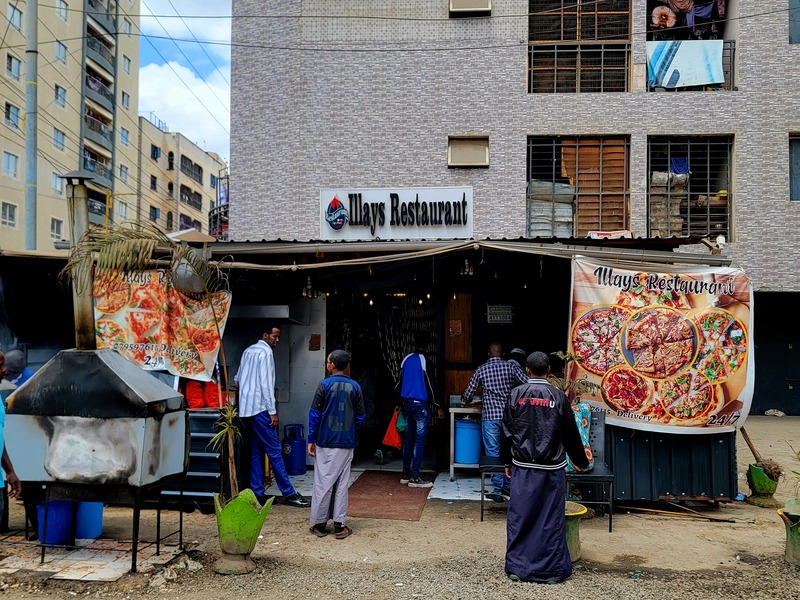California’s Illays Restaurant that demystified the potential of business switch

The food joint now operates 24 hours compared to the less than 12 hours of business when it was a shop
Transitioning from one type of business to another often comes with some fears, including uncertainty about market potential, operational challenges, customer retention and the larger financial risk.
These are among the many fears the owners of Illays Restaurant exhibited when they decided to transition from a general retail shop to a food joint.
More To Read
- Private sector activities rise for the first time in five months in September
- Registrar of Companies seeks public input on new company registration laws
- Mud from Eastleigh's Second Avenue extension spreads to General Wariungi Street, disrupting movement and businesses
- Ghana’s war on illegal gold mining fails: How political elites, corruption undermined moratorium
- Eastleigh booms as East Africa’s borderless marketplace, drawing diverse traders and entrepreneurs
- Roadside traders on Eastleigh’s Athumani Kipanga Street count losses as structures are demolished
Located along General Waruingi Street in California, Kamukunji Constituency, the food joint is now a go-to place for many, from corporate workers to residents. That was not the case when it was a general retail shop.
When The Eastleigh Voice recently visited the restaurant over a lunch hour, Abdihakim Hashi, the manager, was serving customers.
A walk into the joint could tell how welcoming the place is, with excellent customer service.
Some of the customers whom we spoke to on different occasions described the place as having a “feel home” environment.
For the owners, the change of business good. The food joint now operates 24 hours compared to the less than 12 hours of business when it was a shop.
Ideally, this means more customers and more revenue, with the management noting that the business now makes triple the profits it used to make from the previous venture.
It also boasts of the mark it now has on the Eastleigh community as it is now widely known to many for, among other things, its exemplarily unique and tasty food.
“One can get a satisfactory meal for as little as Sh140, and that's what we endeavour to do always, make the customers happy at the least cost possible,” Abdihakim said.
Before the transition into a restaurant, the joint was for about a decade serving as a retail shop selling a variety of household commodities.
“After running it for a while, my partner and I saw there was no defined future for the business yet we aspired for growth,” he said.
According to him, the decision to shift to a restaurant was mainly out of the vision of owning something big.
After considering all the risks and opportunities that would come with the shift, Abdihakim said they decided to overlook the risks and go the opportunities way and effected the shift in December 2023.
The restaurant has gradually grown from a workforce of six in December last year to more than 20 currently.
Abdihakim revealed that they are planning to open another joint in the area due to growing demand from customers.
“Moving from a general shop which was just operating sometimes less than 12 hours to having a business that serves clients all night and day is tremendous growth for us, and as the numbers keep growing, we have to find ways of accommodating all of them. Our progress so far has attracted various firms dealing with food deliveries,” he said.
Abdihakim also revealed that they have received different proposals, including a suggestion to venture into online deliveries and that talks over the same are ongoing.
“This is with a keen focus on the pricing as the venture would mean additional costs to our customers which is something we wouldn't wish to do. As the talks progress, we would seek to strike a common ground that has no big impact on our customers in pricing,” he said.
He said partnerships and collaborations are crucial when deciding to shift from one venture to another.
“Fostered partnership is one thing driving our motives day by day and any business person embracing a partnership should be keen to maintain trust for a smooth and successful business,” said Abdihakim.
He said the secret behind such business growth is ensuring the customer base grows and that one retains the best employees.
“For instance, here we endeavour to retain our cooks at all times because they are the ones who guarantee us the customers who seek the best in terms of variety and taste,” he said.
Low employee retention rates can dampen productivity and have an impact on general employee morale. On the other hand, high retention rates boost employee productivity and result in high employee experience and engagement.
Business shift challenges
For Abdihakim and his partners, the shift to a restaurant came with challenges which would have been insurmountable without determination and focus.
There was a huge jump in the cost of power when they shifted from a retail shop to a restaurant as they were now working for more hours.
“The eatery also came with a compliance challenge. The food handlers, both the cooks and the waiters, have to be equipped with the food handling certificate that costs Sh1,500 per person for six months,” he said.
The other challenge that stood out was the infrastructural adjustment as it also required substantial funding.
As the managers look forward to opening other branches in the area, Abdihakim challenges other business owners to embrace change with a positive outlook, terming it the secret behind business success.
He said entrepreneurs should be dreamers and risk-takers.
Nevertheless, he noted that any business person should avoid being “greedy to the point of going after huge profit margins at the expense of customers”.
Instead, he said, one should be content with the small margins and stay on course to progress and with time, huge returns will come naturally.
Top Stories Today














































